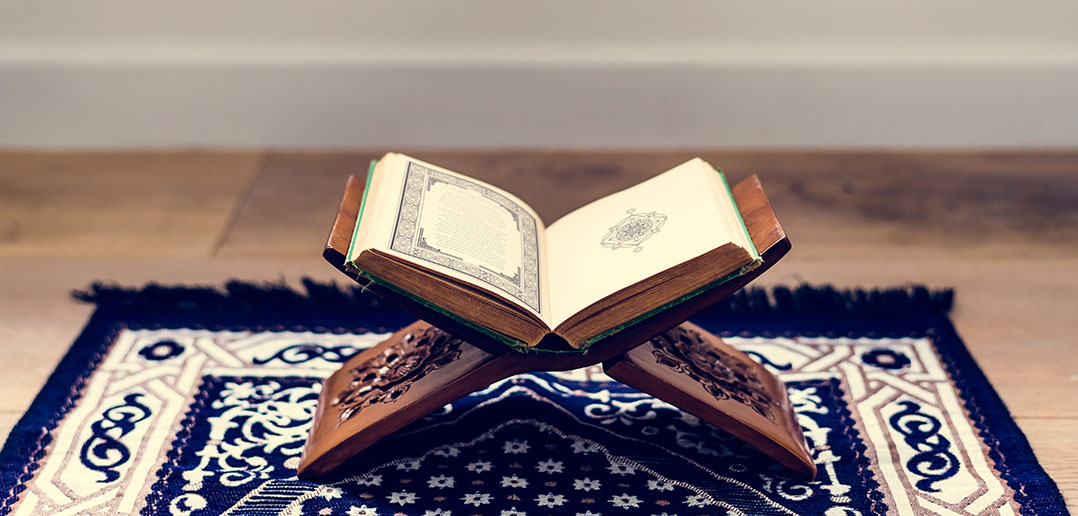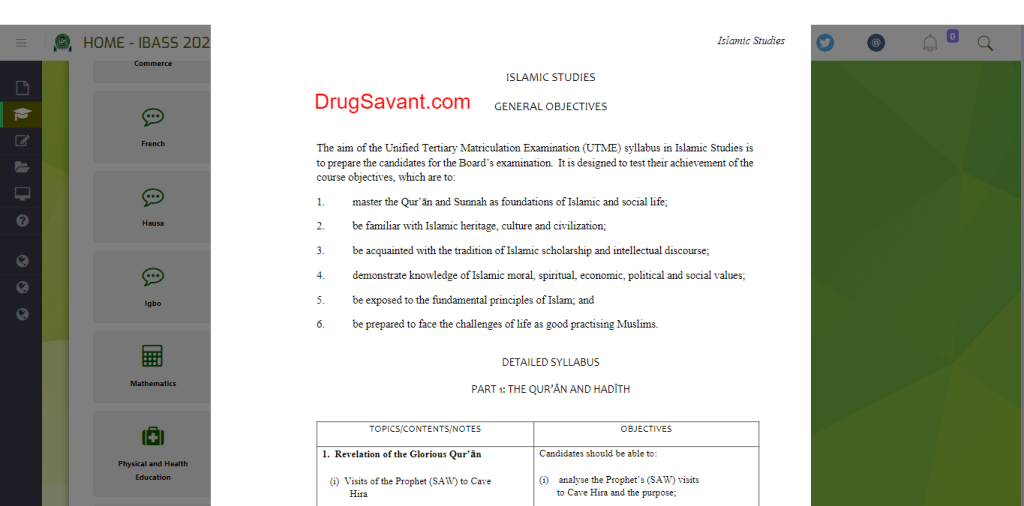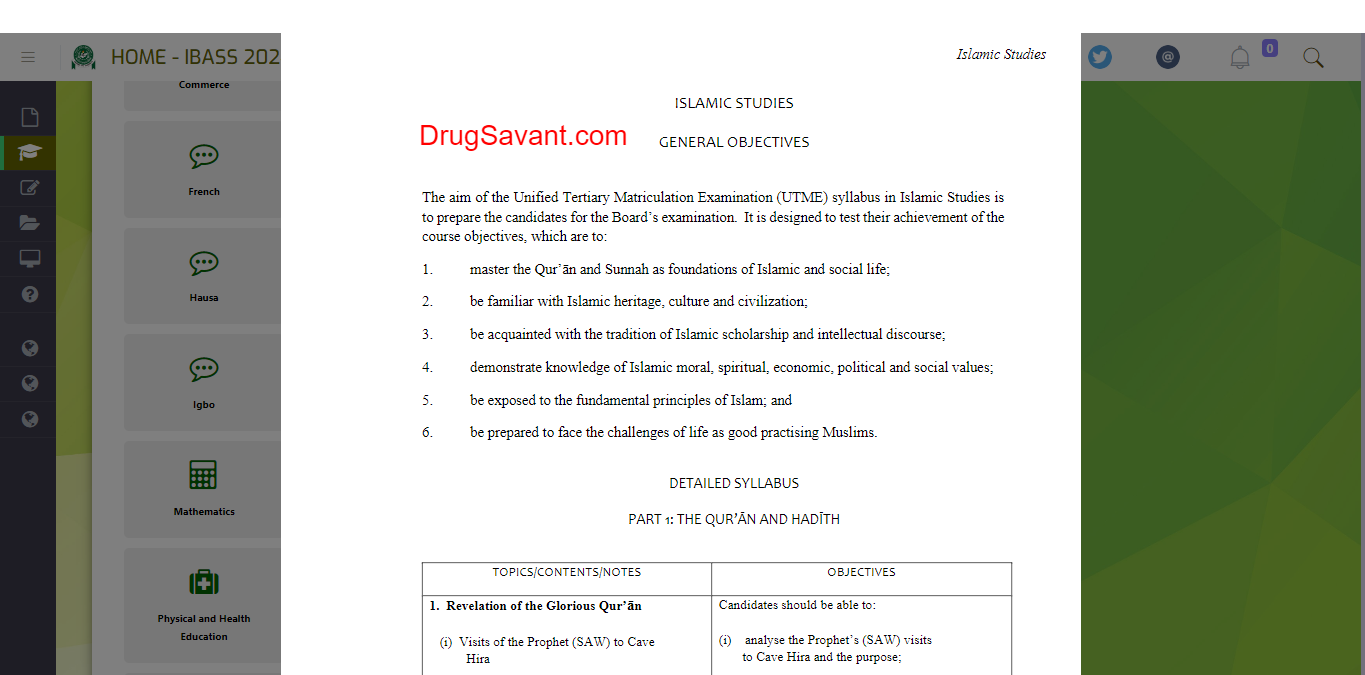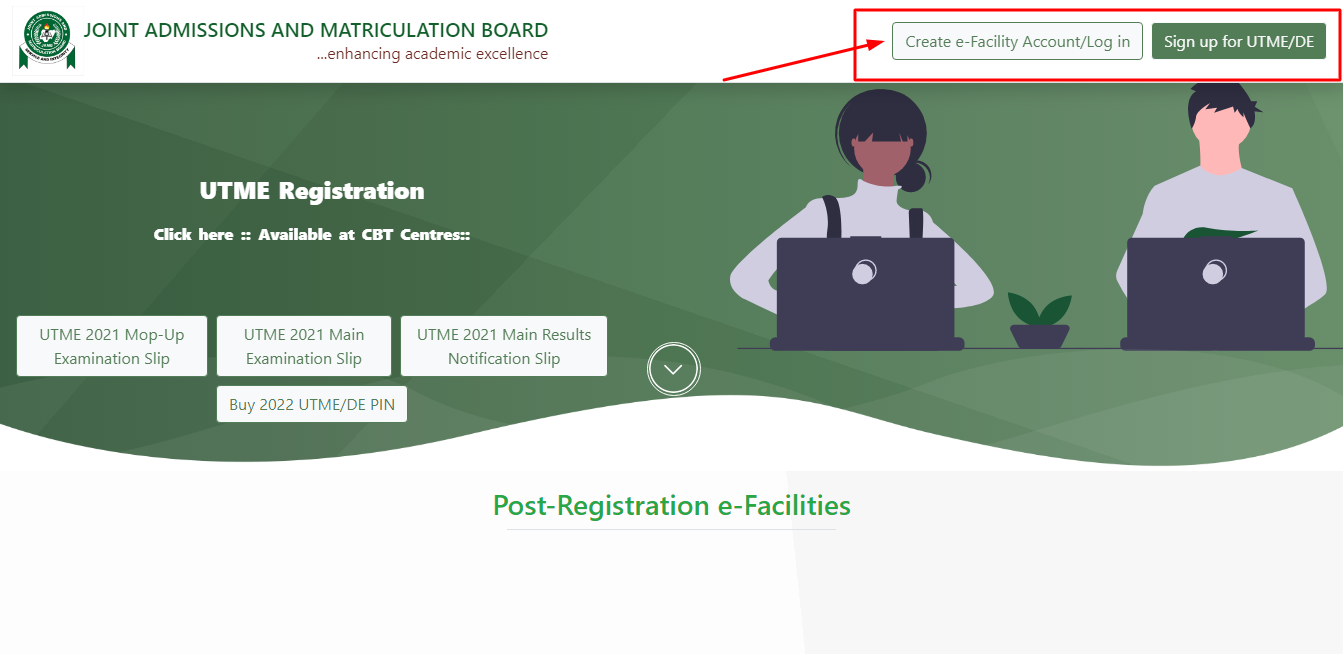JAMB Islamic Studies Syllabus 2024/2025: Is JAMB Syllabus for Islamic Studies out for this year’s JAMB? when will JAMB syllabus for Islamic Studies be out? what topics do JAMB set questions for Islamic Studies the most? what is the most repeated topic in Islamic Studies?
Welcome SAVANT! to another exciting episode of “JAMB Doctor Series” in this episode we will provide you with the official topics recognize by JAMB, which you are expected to be a guru in before entering the hall to sit for your JAMB Exam for Islamic Studies. STAY TUNED!

Have you ever wondered where you can find the topics for Islamic Studies that JAMB normally ask or the most repeated topics or questions? then you are a step away from finding your answer.
JAMB Syllabus is the only expo you will be getting as you prepare for your UTME exams, this syllabus contains area of concentrations and topics your questions will be asked from.
Read Also: WAEC Marking Scheme For All subjects: Grading System
ARE YOU ON TELEGRAM? Subscribe To My Telegram Channel For Frequent Updates & Guide by clicking the "SUBSCRIBE NOW" button below.
Any smart students would cherish this piece and make effective use of it, the fact that you are searching for this now, simply means you are in the right direction. You should see my top notch guide on How To Pass JAMB With High Score (300+).
What Is JAMB Islamic Studies Syllabus?

JAMB Syllabus for Islamic Studies is a collection of topics the board expects you to be well grounded in before the exam.
If Islamic Studies is one of the subjects you will sit for in JAMB, then you need this syllabus, these were actually compiled by JAMB, so it is something you can rely on.
Read also: JAMB Profile 2024/2025: How To Create & Access It (All To Know)
JAMB Syllabus For Islamic Studies

JAMB Islamic Studies syllabus is designed to evaluate your ability to:
- master the Qur’an and Sunnah as foundations of Islamic and social life;
- be familiar with Islamic heritage, culture and civilization;
- be acquainted with the tradition of Islamic scholarship and intellectual discourse;
- demonstrate knowledge of Islamic moral, spiritual, political and social values;
- be prepared to face the challenges of life as good practicing Muslims.
Download your copy of the syllabus using the download link below👇
Below is a detailed syllabus for JAMB History, you can bookmark this page for easy access to this page. ENJOY!
PART 1: THE QUR’AN AND HADITH
1. Revelation of the Glorious Qur’an
Topics:
- Visits of the Prophet (SAW) to Cave Hira
- His reaction to the first revelation and its importance
- Different modes of revelation (Q.42:51): inspiration behind the veil, through an angel, etc.
- Piecemeal revelation (Q.17:106) (Q.25:32)
1b. Preservation of the Glorious Qur’an
Topics:
- Complete arrangement
- Differences between Makkah and Madina suwar
- Recording, compilation and standardization of the Glorious Qur’an
- The role played by the Companions of the Prophet (SAW)
1c. Importance of the Glorious Qur’an
Topics:
- as a source of guidance in spiritual, moral, economic, political and socio-cultural matters.
1d. Proof of the Divine authenticity of the Glorious Qur’an (Q.4:82) (Q.41:42)
Topics:
- Uniqueness of the Glorious Qur’an (Q.39:27) (Q.17:88) (Q.75:16-19)
- Divine preservation of the Glorious Qur’an (Q.15:9)
2. Tafsir
Topics:
- Historical development of Tafsir
- Importance of Tafsir
- Types of Tafsir
3. Introduction to Tajwid (Theory and Practice)
Objectives:
- Candidates should be able to examine the meaning and importance of Tajwid
4. Study of the Arabic text of the following suwar/ayats with tajwid
Topics:
- al-Fatihah (Q.1)
- al -Adiyat (Q.100)
- al -Qari’ah (Q.101)
- at -Takathur (Q.102)
- al -Asr ((Q.103)
- al -Humazah (Q.104)
- al -Maun ((Q.107)
- al -Kawthar (Q.108)
- al – Kafirun (Q. 109)
- al- Nasr (Q. 110)
- al -Masad ((Q.111)
- al -Ikhlas (Q.112)
- al -Falaq ((Q.113)
- an-Nas (Q.114)
5. Study of the Arabic text of the following suwar/ayats with tajwid
Topics:
- al-A’ala (Q.87)
- ad-Duha (Q.93)
- al-Inshirah (Q.94)
- at-Tin (Q.95)
- al-Alaq (Q.96)
- al-Qadr (Q.97)
- al-Bayyinah (Q.98)
- al-Zilzal (Q.99)
- Ayatul-Kursiy (Q.2:255)
- Amanar-Rasul (Q.2:285-6)
- Laqad jaakun (Q.9:128-129)
6. Hadith
Topics:
- History of Hadith literature – Collection of Hadith from the time of the Prophet(SAW) to the period of the six authentic collectors of Hadith
- Authentication of Hadith
- Isnad (Asma’ur-rijal)
- Matn
- Classification of Hadith into Sahih Hassan and Da’if
- The relationship between Hadith and the Glorious Qur’an
- The importance of Hadith
- The similarities and differences between Hadith and the Glorious Qur’an
- The six sound collectors of Hadith – biographies and their works.
- Muwatta and its author – The biography of Imam Malik and the study of his book
- The study of the Arabic texts of the following ahadith from an-Nawawi’s collection: 1,3,5,6,7,9,10,11,12,13,15,16, 18,19,21, 22,25,27,34, and 41
7. Moral lessons in the Glorious Qur’an and Hadith
Topics:
- General moral lessons contained in the admonition of Sage Luqman to his son (Q.31:18-20).
- Goodness to parents (Q.17:23-24)
- Honesty (Q.2:42)(Q.61:2-3)
- Prohibition of bribery and corruption (Q:2:188), alcohol and gambling (Q.2:219) (Q.5:93-94), stealing and fraud (Q.5:41) (83:1-5), smoking, drug abuse and other intoxicants (Q.2:172-173, 195 and 219) (Q.4:43) (Q.5:3) (Q.6:118-121) arrogance (Q.31:18-19) and extravagance (Q.17:26-27) (Q.31:18-19)
- Dignity of labour (Q.62:10) (Q.78:11) Hadith from Bukhari and Ibn Majah: “that one of you takes his rope…….” “never has anyone of you eaten…..”.
- Behaviour and modesty in dressing (Q.24:27-31) (Q.33:59)
- Adultery and fornication (Q.17:32) (Q.24:2), homosexuality (Q.11:77-78) and obscenity (Q:4:14-15) Hadith – “No one of you should meet a woman privately …… “Bukhari
- Leadership (Q.2:124) and justice (Q.4:58 and 135) (Q.5:9) Hadith – ‘take care everyone of you is a governor …… concerning his subjects” (al-Bukhari and others)
- Trust and obligations (Q:4:58) (Q.5:1) and promises (Q.16:91) Hadith ‘he has (really) no faith ….. Not fulfilled his promise” (Baihaqi)
- Piety (Taqwa) (Q:2:177) (Q.3:102) (Q.49:13) Hadith 18 and 35 of an Nawawi
- Tolerance, perseverance and patience (Q.2:153-157) (Q.3:200) (Q.103:3) Hadith 16 of an-Nawawi
- Unity and brotherhood (Q.3:103) (Q.8:46) (Q.49:10) Hadith 35 of an-Nawawi
- Enjoining what is good and forbidding what is wrong (Q.3:104 and 110) (Q.16:90) Hadith 25 and 34 of an Nawawi
8. PART II: TAWHID AND FIQH
Faith
Topics:
- Tawhid Its importance and lessons
Kalimatush-Shahadah
Topics
- Its meaning and importance
- iThe Oneness of Allah as contained in the following verses: (Q.3:19) Q.2:255) (Q.112:1-4)
- The servanthood and messengership of the Prophet Muhammad (SAW) as contained in the following verses (Q.3:144) (Q.18:110) (Q.48:29) and (Q.34:28)
- Universality of his message (Q.7:158) (Q.34:28)
- Finality of his Prophethood (Q.33:40)
Shirk
- Beliefs which are incompatible with the Islamic principles of Tawhid:
- Worship of Idols (Q.4:48) (Q.22:31)
- Ancestral worship (Q.4:48 and 116) (Q.21:66-67)
- Trinity (Q.4:171) (Q.5:76) (Q.112:1-4)
- Atheism (Q.45:24) (Q.72:6) (Q.79:17-22)
General practices which are incompatible with Islamic principles of Tawhid:
- Superstition (Q.25:43) (Q.72:6)
- Fortune-telling (Q.15:16-18)(Q.37:6-10)
- Magic and witchcraft (Q.2:102) (Q.20:69) and 73) (Q.26:46)
- Cult worship (Q.17:23) (Q.4:48)
- Innovation (Bid’ah) (Q.4:116) and Hadith 5 and 28 of an-Nawawi
9. Article of faith
Topics:
- Belief in Allah
- Existence of Allah (Q.2:255) (Q.52:35-36)
- Attributes of Allah (Q.59:22-24)
- The works of Allah (Q.27:59:64)
- Belief in Allah’s angels (Q.2:177 and 285) (Q.8:50) (Q.16:2)
- His books (Q.2:253) and 285) (Q.3:3)
- His Prophets: Ulul-azmi (Q.4:163-164)
- The Last Day: Yawm-al-Ba’th (Q.23:15-16) (Q.70:4)
- Destiny: distinction between Qada and Qadar (Q.2:117) (Q.16:40) (Q.36:82)
10. Ibadat and their types
Topics:
- Good deeds (Q.3:134) (Q.6:160) (Q.2:177) (Q.31:8) (Q.103:1-3) 26th Hadith of an-Nawawi
- Taharah, its types and importance (al-istinja’/istijmar, alwudu’, at-tayammum and al-ghusl (Q.2:222) (Q.5:7) Hadith 10 and 23 of an-Nawawi.
Salah
Topics:
- Importance: (Q.2:45) (Q.20:132) (Q.29:45) and Hadith 23rd of an-Nawawi
- Description and types of salah
- Things that vitiate salah
Zakah
Topics
- Its types and importance (zakatul-fitr, zakatul mal, al-an-am and al-harth (Q.2:267) (Q.9:103) 3rd Hadith of an-Nawawi
- Collection and disbursement (Q.9:60)
- Difference between Zakah and sadaqah
Sawm
Topics
- Its types and importance (fard, sunnah, qada and kaffarah) (Q.2:183-185) 3rd Hadith of an-Nawawi
- People exempted from sawm
- Things that vitiate sawm
Hajj
Topics
- Its importance (Q.2:158 and 197) (Q.3:97) (Q.22:27-28)
- Type (Ifrad, Qiran and Tamattu)
- Essentials of Hajj (Arkan al Hajj)
- Conditions for the performance of Hajj
- Differences between Hajj and Umrah
Jihad: Concept, kinds, manner and Lessons (Q.2:190-193) (Q.22:39-40)
Candidates should be able to:
- examine the concepts of jihad and its type;
- evaluate the manner of carrying out jihad and its lessons.
11. Family Matters
Topics:
- Marriage
- Importance (Q.16:72) (Q.24:32) (Q.30:20-21)
- Prohibited categories (Q.2:221) (Q.4:22-24)
- Conditions for its validity (Q.4:4) (Q.4:24-25)
- Rights and duties of husbands and wives (Q.4:34-35) (Q.20:132) (Q.65:6-7)
- Polygamy (Q.4:3 and 129)
- Idrar ill-treatment of wife (Q. 65:1-3)
Divorce
Topics
- Attitude of Islamic to divorce (Q.2:228) (Q.4:34-35) Hadith “of al things lawful ….. most hateful to Allah..” (Abu Daud 15:3)
- Kinds (Talaq, Khul;, Faskh, Mubara’ah and Lian) (Q.2:229-230) (Q.24:6-9)
- Iddah, kinds, duration and importance (Q.2:228 and 234)
- Prohibited forms of dissolution of marriage. (Ila and Zihar) (Q.2:226-227) (Q.58:2-4)
- Custody of children (Hadanah)
Inheritance
Topics
- Its importance
- Heirs and their shares (Q.4:7-8, 11-12 and 176)
12. Sources and Schools of Law
Topics:
- The four major sources (the Qur’an, Sunnah, Ijma and Qiyas)
- The four Sunni Schools of law
13. Islamic Economic System
Topics:
- Islamic attitude to Riba (Q.2:275-280) (Q.3:130) (Q.4:161) Hadith 6th of an-Nawawi
- At-tatfif (Q.83:1-6)
- Hoarding (ihtikar) (Q.9:34)
- Islamic sources of revenue: Zakah, Jizyah, Kharaj and Ghanimah
- Baitul-mal as an institution of socio-economic welfare
- Difference between the Islamic economic system and the Western economic system
Islamic Political System
Topics
- Allah as the Sovereign (Q.3:26-27).
- The concept of Shurah (consultation) (Q.3:159( (Q.42:38).
- The concept of Adalah (justice) (Q.5.9) (Q.17:13-14 and 36) and MasÂ’uliyah (accountability) (Q.4:58) (Q..102:8).
- The rights of non-Muslims in an Islamic state (Q.2:256) (Q.6:108).
- Differences between the Islamic political system and the Western political system.
PART III: ISLAMIC HISTORY AND CIVILIZATION
15. Pre-Islamic Arabia (Jahiliyyah)
Topics:
- Jahiliyyah practices: idol worship, infanticide, polyandry, gambling, usury, etc.
- Islamic reforms
16. The Life of Prophet Muhammad (SAW)
Topics:
- His birth and early life
- His call to Prophethood
- Da’wah in Makkah and Madinah
- The Hjrah
- Administration of the Ummah and the role of the mosque (Q.3:159) (Q.4:58 and 135)
- The Battles of Badr, Uhud and Khandaq: causes and effects
- The Treaty of al-Hudaibiyyah and the conquest of Makkah
- Hijjatul-wada (the farewell pilgrimage) sermon, and lessons.
- Qualities of Muhammad (SAW) and lessons learnt from them
17. The Rightly Guided Caliphs ((Al-khulafaa’U rashidun)
Topics:
- The lives and contributions of the four Rightly Guided Caliphs
18. Early contact of Islam with Africa
Topics:
- Hijrah to Abyssinia
- The spread of Islam to Egypt
- The role of traders, teachers, preachers, Murabitun, Sufi orders and Mujaddidun to the spread of Islam in West Africa.
19. The Impact of Islam in West Africa
Topics:
- The influence of Islam on the socio-political life of some West African Empires: Ghana, Mali, Songhai and Borno
- The impact of Islam on the economic life of some West African states: Timbuktu, Kano and Borno
20. Contributions of Islam to Education
Topics:
- The aims and objectives of Islamic Education
- The Glorious Qur’an and Hadith on Education (Q.96:1-5) (Q.39:9)
- “The search for knowledge is obligatory on every Muslim” (Ibn Majah)
- “Seek knowledge from the cradle to the grave”
- “The words of wisdom are a lost property of the believer ….. a better right to it …..“ (Tirmidhi)
Frequently Asked Questions
How Many Questions JAMB Sets In Islamic Studies?
The total number of questions JAMB asked in Islamic Studies is 40, with each question carrying 2.5 marks.
This means if after answering Islamic Studies, you were able to answer 30 questions correctly in JAMB you have been able to secure 75 marks for yourself.
JAMB Recommended Textbooks For Islamic Studies
To make sure your reading is inline with what your should know, JAMB has prepared a list of textbooks that will help you achieve that purpose.
Is JAMB Islamic Studies Syllabus For 2024 Out?
Yes, JAMB syllabus for Islamic Studies is out.
In Conclusion
It is advisable you go through these topics listed here, as they would help you have a more directed preparation and reading for Islamic Studies in JAMB.
This will be all for now, I understand you may have a question or two to ask, feel free to drop them using the comment box below!
Ensure to share this with friends on Facebook, Whatsapp, or any other social media network you can connect them with…
Related Searches... a. Jamb islamic studies syllabus pdf b. Jamb islamic studies syllabus 2021 c. islamic studies syllabus (pdf) d. jamb islamic studies questions and answers pdf



